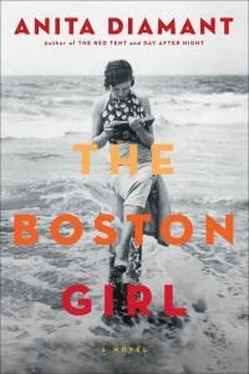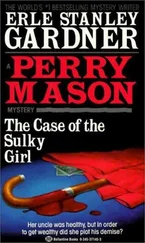It was cooler when we got to the forest, and Miss Holbrooke said, “We’ll be there soon, girls.” We started walking faster and everyone tried to guess what wonder we were going to see. A waterfall? Blueberries?
But when she stopped and said, “Here we are!” I didn’t see anything special—just trees and shrubs and rocks.
“Where are we?” said Gussie.
Miss Holbrooke walked over to a huge boulder and patted it as if it were a puppy. “We have reached our first erratic and one of my favorite specimens. Isn’t it a beauty?”
Nobody said a word until Irene muttered, “We came all this way to look at a stupid rock?”
I was sweaty and thirsty, my legs ached, I had blisters on both feet, and I thought that was the funniest thing I’d ever heard.
Miss Holbrooke spun around and gave me the fish-eye but I couldn’t stop laughing. I covered my mouth and turned around but by then Rose was laughing, and she had one of those big belly laughs that got everyone else going.
Miss Holbrooke was furious. Then she was offended. And then hurt.
“I suppose not everyone has a taste for geology,” she said.
“Thank goodness she’s not the cook,” Irene said, and I cracked up all over again.
—
Irene didn’t come to supper that night. Rose said she’d gotten a bad sunburn. “But it’s her own fault for throwing away the hat. I’m washing my hands of that girl.”
I said, “She’s not so bad, but it makes you wonder why she’s here at all.”
Rose had found out that much. Her brother had sent her and paid her way. “I told Irene that makes him a saint in my book, and she gave me a look that would have boiled an egg.”
After supper, Miss Case opened her ledger to tell us about the schedule for the week, and it all sounded wonderful. There was going to be a breakfast cookout, a trip to Good Harbor Beach, blueberry picking, shopping in Rockport and Gloucester. We were going to a town dance, too, which got everyone whispering and giggling.
That’s when I noticed Irene peeking in from the hallway. She had a cloth pressed against her forehead and I went out and asked if she was okay.
She said she was fine. “If Mrs. Morse hadn’t sent into town for ice, I think my nose would have peeled off.”
“It looks like it hurts,” I said.
Irene shrugged, but then she hid her face in the towel and started to cry.
I sat down with her on the steps and she told me the story of how she had come to America with her older brother five years ago and the two of them had taken care of each other. But he’d gotten married and his new wife, “the cow, Kathleen,” wanted Irene out of their apartment right away. Without a word to Irene, the wife got her a job as a live-in maid in Worcester. “Do you have any idea how far that is from Boston?” Irene said.
The brother wouldn’t stand up against his bride, so he sent Irene to Rockport as a kind of peace offering. Irene called it “the old heave-ho.”
“I was in service once, and never again. The lady of the house thinks she owns you and calls you a thief if you eat the crusts she leaves on her plate, but it’s her who steals your days off. I’d sooner walk the streets.”
I said there had to be something we could do to help. She shook her head and said, “You’re a good kid,” and then she went upstairs alone.
I walked straight over to Rose and told her what was what with Irene. She called the brother a no-good bum and a few other things and said, “I feel terrible about what I said about the poor girl.” She went upstairs and told Irene that she would be staying with her until she got on her feet; no arguments and no thanks needed. “What are friends for?” Rose said.
And just like that, the chip on Irene’s shoulder disappeared. Her dimples became the envy of everyone and her impersonation of Miss Holbrooke had us rolling on the floor.
“Allow me to serve you a taste of scenery,” Irene said, in Miss Holbrooke’s voice, which was singsong and fruity, sort of like Julia Child’s, come to think of it.
“Now, who wants a piping hot slab of granite?”
It still makes me laugh.
You have a good eye.
The best part of that week was my time with Filomena.
We stayed up late every night talking, talking, talking. She seemed so grown up, I couldn’t believe that she was only nineteen—just three years older than me.
We started with our families and I still remember all of her sisters’ names: Maria Immaculata, Maria Teresa, Maria Domenica, Maria Sofia, and she was Maria Filomena—the youngest and also the only unmarried one.
Her parents died when she was a baby, so Mimi—Immaculata—raised her. The whole family lived within a few blocks of each other in the North End, and when I met Filomena, she was staying with Sophie—Maria Sofia—and sharing the couch with two of her three boys. Filomena said she looked forward to coming to Rockport Lodge just so she could sleep without a squirming child waking her up.
Filomena left school when she was twelve and went to work sewing in a factory. A few years later, she started going to the Salem Street Settlement House on Saturdays. “I told Mimi that I wanted to improve my English,” she said, “but really it was just to have a little time when I wasn’t at work or taking care of someone’s baby.” Miss Chevalier noticed her sketching in the library when she was supposed to be reading, “But instead of yelling at me, she took me to meet Miss Green. And here I am.”
Not so different from my story, right?
Miss Green sent her to the Museum School for a drawing class. “I owe her everything,” Filomena said. “She taught me pottery and design and gives me art books to look at. She says that being an artist is more than a job or a skill; it’s a way of walking through the world.”
I didn’t understand what that meant until a few days later, when we went to the Headlands, which Miss Holbrooke said was the most beautiful view on Cape Ann.
Irene rolled her eyes. “Stone soup, anyone?”
But Miss Holbrooke was right about the Headlands. It’s a special place—up high, maybe a hundred feet above the sea, with water on three sides.
You know where I’m talking about, right, Ava? It’s the place I always bring people who’ve never been to Cape Ann. You can see for miles up and down the coast. It’s got a nice view of the boats in Rockport Harbor and most of the town, too. The first time I saw all those white clapboard houses and the church steeple I thought about how much I owed to Paul Revere for getting me there.
Miss Holbrooke called it picturesque and I knew exactly what she meant without having to look it up. It was like one of those tinted picture postcards: a perfect blue sky and fluffy white clouds, sailboats, and even a few ladies with parasols.
The lodge girls scattered around to pick flowers or sit on the rocks and talk. Rose and Irene climbed halfway down the bluff, which almost gave Miss Holbrooke a heart attack. Filomena went off by herself to draw, but I tiptoed over and peeked at her sketchpad.
She was drawing the pile of rocks in front of her, which seemed like a dull subject. But when I looked again, I saw she had made the same shapes into a woman’s body, lying on her side, completely naked. I’d probably never seen a nude picture before and I must have gasped. Filomena turned around and held it up so I had a better view. “What do you think?”
Before I could answer, Miss Holbrooke came running toward us, yoo-hooing for Filomena to come with her. Two ladies had set up easels to do watercolors of the harbor. “You should meet them; they are painting the most charming little harbor scenes.”
Filomena wrinkled her nose. “Miss Green says ‘charming’ is a trap that women artists should avoid at all costs.”
Читать дальше












